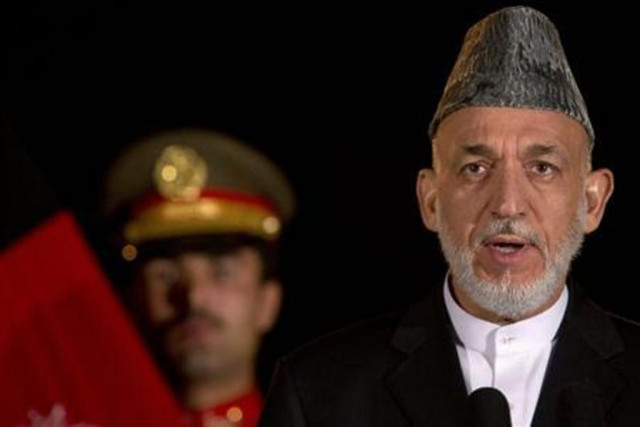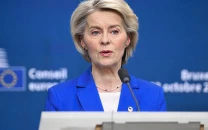Afghanistan says differences remain on US security pact
For almost a year, Washington and Kabul have been seeking to conclude a Bilateral Security Agreement.

Afghan President Hamid Karzai speaks during a news conference with US Secretary of State John Kerry (not pictured) at the Presidential Palace in Kabul October 12, 2013. PHOTO: REUTERS
Two years ago, the United States ended its military mission in Iraq with a similar "zero option" outcome after the failure of bilateral talks with Baghdad.
For almost a year, Washington and Kabul have been seeking to conclude a Bilateral Security Agreement (BSA) that will help determine how many US soldiers and bases remain in Afghanistan after most foreign combat troops exit by the end of next year.
US Secretary of State John Kerry told reporters at the end of a visit to Kabul this month that there was just one issue outstanding - Washington's demand that its troops be immune from Afghan law and tried in the United States instead.
But the issue was not even raised in the two days Kerry was in Kabul, said Aimal Faizi, the spokesman for Afghan President Hamid Karzai.
He said there were also a number of other areas which the two countries have yet to agree on. "A lot of progress has been made on the document, but it is not finalised," Faizi told Reuters in an interview at the presidential palace.
"If we do not reach a final agreement on this draft, it will go to the Loya Jirga and the Afghan people will be able to look at the issues remaining." Faizi said. "If it's unfinished, it means that there are some areas even the two governments have not yet reached an agreement on."
The Loya Jirga, an assembly of Afghanistan's tribal elders, is to meet in November to discuss the security agreement.
However, US President Barack Obama' administration regards the language that Kerry and Karzai hammered out in a weekend of marathon talks to be essentially the final version that will be put before the Loya Jirga for its approval.
"The text that will be presented to the Loya Jirga is what we left Afghanistan with on Saturday (October 12)," US State Department spokeswoman Jen Psaki told reporters last week.
US officials are increasingly impatient to conclude the deal because they need time to implement plans for 2015. Washington wanted an agreement by the summer and most recently set an October 31 deadline, but there is now no chance of a final agreement before late November. The Obama administration has yet to set a new deadline.
Faizi said both countries needed the deal but Afghanistan was in no rush to sign the pact.
"The president has said this previously. We are not in a hurry to sign this document, if not finalised, this could continue with the next government," he said.
"There are some key issues still remaining but it is not really a lot of work," he added, indicating a deal could be reached with Karzai before presidential elections scheduled for April. Karzai cannot run for re-election because he has already served the maximum two terms.
Adding to pressure to avoid major delays, Washington has made clear that it opposes the idea of waiting to finalize the pact with Karzai's successor and that US patience is not without limits. "It remains our goal to conclude it as soon as we can," a US official said.
Disagreements
The United States has said the deal would collapse if US soldiers were not granted immunity from the Afghan judicial process.
US officials insist that a security agreement is in both countries' interest but say the Obama administration is not bluffing about resorting to the "zero option" - as it did in Iraq two years ago - if any residual American troops are not granted immunity from Afghan prosecution.
Other outstanding differences include the thorny issue of unilateral US military operations which have long infuriated Karzai. He has said such action violates Afghan sovereignty as well as previous agreements and inflicts terrible casualties on civilians.
While progress had been made in this area, Faizi said it remained unresolved. Afghanistan is refusing to let the United States take unilateral military action even in retaliation against an attack.
"The Afghan government, as the host country, will take action," Faizi said. "The US will not have the right to retaliate unilaterally if US forces or bases are attacked. We are against all kinds of unilateral military operations."
Other issues included the ways in which the United States would continue to build and equip the Afghan security forces, and how many bases the US will be allowed to retain.
"We have the US asking for nine military bases, to which the government of Afghanistan has agreed. So now, it is up to the people in the Loya Jirga to decide if they want less or more," Faizi said.
Differences over a crucial issue that had previously stalled talks had however been resolved, Faizi said.
Afghanistan had been requesting a guarantee of protection from external aggression, something the US had been reluctant to agree to as it could require offensive action against another ally, neighbouring Pakistan.
"The definition that we have for aggression - which both sides have agreed on - is much better than before ... We can say that we reached a kind of agreement," Faizi said.
US officials said Kerry and Karzai had resolved differences over the wording of the guarantee but offered only a vague explanation of what had been agreed.
"The Bilateral Security Agreement is clearly something that stopped short of a mutual defence pact," a senior administration official said last week. "And the language that we found, I think, is sufficient to both parties in terms of not overreaching the bounds of what can be."
With US officials largely optimistic about the chances that the security pact will win approval from the Loya Jirga, Defence Secretary Chuck Hagel said on Monday that progress toward an agreement was "on track" and "not behind schedule."
However, Washington is concerned that as campaigning for the Afghan election intensifies, it will be harder to broker a deal.
The election is considered the most crucial since the US-led overthrow of the Taliban in 2001, which brought Karzai to power. The NATO-led force in Afghanistan is hoping for a credible handover before most troops are pulled out at the end of next year.












1724319076-0/Untitled-design-(5)1724319076-0-208x130.webp)






COMMENTS
Comments are moderated and generally will be posted if they are on-topic and not abusive.
For more information, please see our Comments FAQ